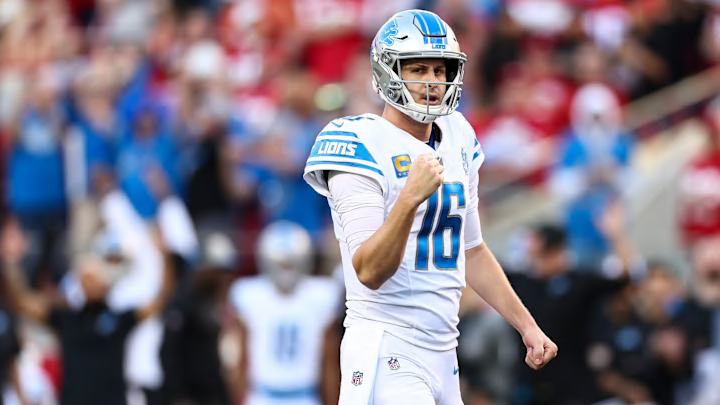Among the big contract extensions the Detroit Lions have done this offseason, the new deal for Jared Goff was naturally a little more complicated and thus it was the last of the three to be done. As the quarterback market continually rises, the team surely wanted to get a deal done sooner while Goff's side may have been willing to wait for another contract chip to fall.
Goff is now (and for now) the second-highest paid quarterback in the NFL ($53 million per year) with his new contract. In his press conference on Thursday, he made it clear he wanted security (including a no-trade clause he revealed) more than to full maximize his dollars. A record $73 million signing bonus surely stands as a way to maximize dollars, but that's a separate conversation.
It always felt inevitable the Lions and Goff would get a contract extension done before the season started, and perhaps well before the season started. The team theoretically could have let him play out the final year of his now-old deal, franchise tagged him for 2025 and gone from there, but general manager Brad Holmes made it clear that's not how he was going to do business.
But could the Lions have waited to sign Goff long-term? Should they have waited? It's an interesting angle to consider.
Did the Lions move too quickly to get Jared Goff's deal done?
There's a solid case that the reward of signing Goff long-term outweighs any risk for the Lions. But Pat Caputo of 97.1 The Ticket has taken the opposite tack, suggesting that while it made sense for the Lions to invest in the certainty of Goff, there is some risk.
"It’s unwise to confuse that aspect of Goff’s extension with the risk involved. It’s considerable, and it’s possible that the Lions will ultimately regret not waiting until after this season to do it."
Waiting until after the season to extend Goff would have invited a hold out, though the current rules make training camp holdouts less likely. But he could have not shown up for the next phase of OTAs, which starts next week, making it a little harder for the Lions to have meaningful voluntary offseason workouts.
Mike Florio of Pro Football Talk has lightly questioned the timing of the Goff deal a couple times. Most recently, he provided a bit of insight beyond his own thoughts.
"And here’s the real question that some in league circles have been asking. Who were the Lions negotiating against in giving Goff such a major deal?"
"As one league source put it, “Goff is the epitome of a team bidding against themselves.”
"The Lions could have let it ride. They would have tagged Goff in 2025. They could have let him go to market and see if someone would have offered him anything close to what the Lions are paying — more than $47 million per year on a five-year contract, with a practical guarantee at signing of more than $148 million."
There's something to the idea the Lions should've (or could've) waited to get the deal done with Goff. But it was never going to happen. They were not going to go into the 2024 season without having committed to him beyond it. They value him very highly-tangibly, intangibly; right or wrong-and the market said they were going to have to pay him handsomely. Waiting much longer would have only made it more expensive, assuming some other quarterback contracts got done.
